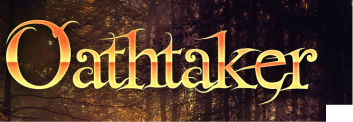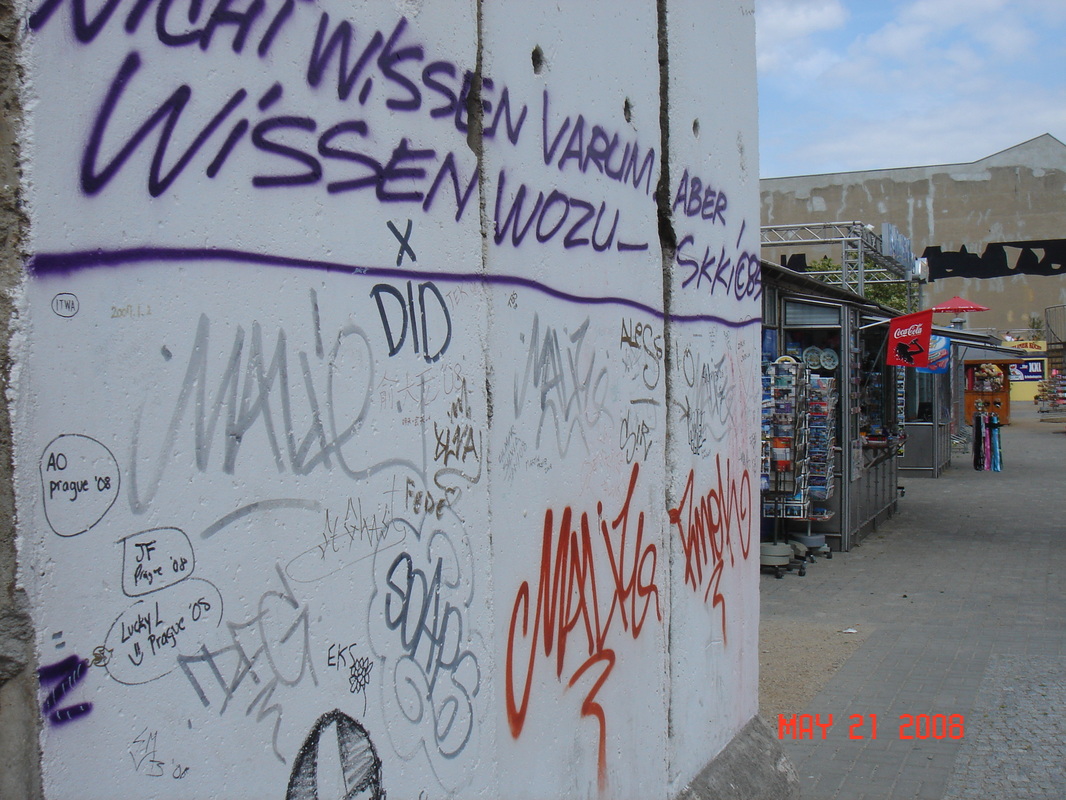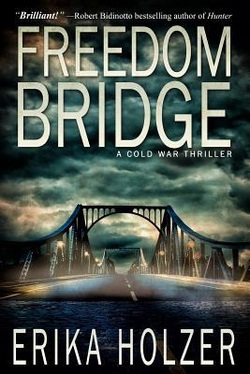
* * * *
I downloaded a free copy of Freedom Bridge from Amazon. In exchange, I offer the author this—my fair and honest review.
The first time I visited Berlin was in 1973. The Berlin Wall was quite a sight. I recall seeing white crosses and barbed wire, the last signs of some of those souls who had sought and fought for freedom—and lost. It made a strong impression on my young mind. I recall being mesmerized years later, as I watched live television footage of the Wall coming down (in 1989).
I downloaded a free copy of Freedom Bridge from Amazon. In exchange, I offer the author this—my fair and honest review.
The first time I visited Berlin was in 1973. The Berlin Wall was quite a sight. I recall seeing white crosses and barbed wire, the last signs of some of those souls who had sought and fought for freedom—and lost. It made a strong impression on my young mind. I recall being mesmerized years later, as I watched live television footage of the Wall coming down (in 1989).
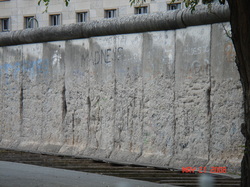
In 2008, I visited that great city once again—and Berlin is a truly great city. The inner parks are lovely; the ancient feel to some of the streets thought provoking; the grand buildings, exquisite. I picked up a souvenir piece of the Wall during that visit and I keep it as a reminder. . . .
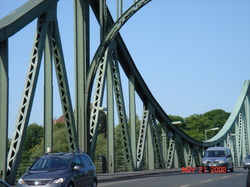
I took a detour one day to Potsdam, making my way there by going over the famous Glienicke Bridge, the “Bridge of Spies.” Potsdam, a city that had once been the home of the former Prussian royalty, later taken over by the Soviets, was still in the process of being re-built almost ten years after the Soviets “left” it. I saw some of the most beautiful “houses” ever. In some places one that had been completely restored stood amidst others that still showed the severe neglect and damage that had come with Soviet control.
I was pleased to have the opportunity to revisit in my mind, some of these places and things in my read of Freedom Bridge: A Cold War Thriller, by Erika Holzer.
In Freedom Bridge, we meet three brothers, all born behind the iron curtain. One makes it out with his mother, when the two are allowed to leave for emergency medical attention for the child during his early years. Though his mother believes she will never see her other two children again, she determines that at least one will live in freedom. Thus, she does not return to the Soviet Union. Rather, she finds a new identity and moves to the U.S. Her son receives the medical treatment he requires, grows and becomes a famous doctor.
Back in the Soviet Union, two remaining brothers carry the stigma of a family member who has abandoned their homeland. To compensate, one grows to be a party member, flexing his muscle as and when he might, orchestrating events to maintain control over others. The other shuns the party and grows to become a doctor himself, struggling to keep secret from his power-crazed older brother, his desire to defect. Through a series of unexpected events, the three eventually meet again. While I thoroughly enjoyed the story, I did have one issue that accounts for the missing “star” in my rating and that is that I found it highly unlikely that one brother would look so very much like another that no one (including the man’s wife) would be able to tell the two apart. (I may not have had this problem if the two had been born “identical” twins, but they were not.) Even so, Holzer has provided a fully satisfying mystery/suspense.
Freedom Bridge opens with a reminder of some of the results of the ruthlessness of an ideology that will not allow independence of thought and spirit and word. Here lies the danger in collectivism, in statism: the institutionalized force “necessary to implement it.” The experiment in the Soviet Union, Holzer reminds us, left “almost 80 years of power destroyed nations, tens of millions of corpses, and the moribund but never fully discredited killer viruses of collectivism and statism.” All freedom lovers should take note: the very concept of “political correctness” implies that there is only one way to think and to act. Ultimately, it requires force to fully implement that single way. As Friedrich A. von Hayek illustrated in The Road to Serfdom, in the end the price may be more than your freedom and that of your friends, family and neighbors. In the end, the price may be your life itself.
Freedom Bridge is available on Amazon here and at Barnes and Noble here.
Also posted on Amazon and Barnes and Noble, Goodreads and Booklikes. Review added to two review groups on Google + and tweeted. Cover pinned.
I was pleased to have the opportunity to revisit in my mind, some of these places and things in my read of Freedom Bridge: A Cold War Thriller, by Erika Holzer.
In Freedom Bridge, we meet three brothers, all born behind the iron curtain. One makes it out with his mother, when the two are allowed to leave for emergency medical attention for the child during his early years. Though his mother believes she will never see her other two children again, she determines that at least one will live in freedom. Thus, she does not return to the Soviet Union. Rather, she finds a new identity and moves to the U.S. Her son receives the medical treatment he requires, grows and becomes a famous doctor.
Back in the Soviet Union, two remaining brothers carry the stigma of a family member who has abandoned their homeland. To compensate, one grows to be a party member, flexing his muscle as and when he might, orchestrating events to maintain control over others. The other shuns the party and grows to become a doctor himself, struggling to keep secret from his power-crazed older brother, his desire to defect. Through a series of unexpected events, the three eventually meet again. While I thoroughly enjoyed the story, I did have one issue that accounts for the missing “star” in my rating and that is that I found it highly unlikely that one brother would look so very much like another that no one (including the man’s wife) would be able to tell the two apart. (I may not have had this problem if the two had been born “identical” twins, but they were not.) Even so, Holzer has provided a fully satisfying mystery/suspense.
Freedom Bridge opens with a reminder of some of the results of the ruthlessness of an ideology that will not allow independence of thought and spirit and word. Here lies the danger in collectivism, in statism: the institutionalized force “necessary to implement it.” The experiment in the Soviet Union, Holzer reminds us, left “almost 80 years of power destroyed nations, tens of millions of corpses, and the moribund but never fully discredited killer viruses of collectivism and statism.” All freedom lovers should take note: the very concept of “political correctness” implies that there is only one way to think and to act. Ultimately, it requires force to fully implement that single way. As Friedrich A. von Hayek illustrated in The Road to Serfdom, in the end the price may be more than your freedom and that of your friends, family and neighbors. In the end, the price may be your life itself.
Freedom Bridge is available on Amazon here and at Barnes and Noble here.
Also posted on Amazon and Barnes and Noble, Goodreads and Booklikes. Review added to two review groups on Google + and tweeted. Cover pinned.
